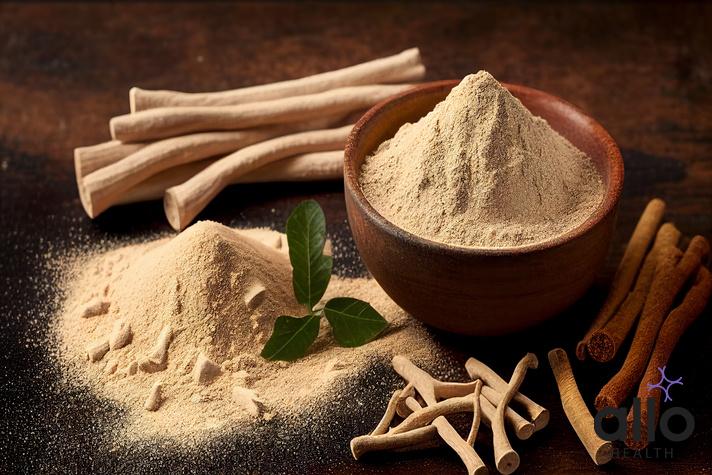Unveiling the Health Secrets: Benefits of Ashwagandha Powder with Milk

Allo Health is dedicated to personalized well-being, offering support and trusted information tailored to individual health goals. The platform emphasizes human-generated content, led by a distinguished medical team of experts, including physicians and sexual health specialists. Their commitment to credibility involves rigorous fact-checking, authoritative research, and continuous updates to ensure accurate, up-to-date information. Allo Health's unique approach goes beyond conventional platforms, providing expert-led insights and a continuous commitment to excellence, with user feedback playing a crucial role in shaping the platform's authoritative voice.

Dr.Sushma.V completed MBBS degree from BGS GIMS,bangalore
Why This Was Upated?
Our experts continually monitor the health and wellness space, and we update our articles when new information became available.
Updated on 13 April, 2024
- Article was updated as part of our commitment to diversity, equity, and inclusion.

"The following blog article provides general information and insights on various topics. However, it is important to note that the information presented is not intended as professional advice in any specific field or area. The content of this blog is for general educational and informational purposes only.
Book consultation
The content should not be interpreted as endorsement, recommendation, or guarantee of any product, service, or information mentioned. Readers are solely responsible for the decisions and actions they take based on the information provided in this blog. It is essential to exercise individual judgment, critical thinking, and personal responsibility when applying or implementing any information or suggestions discussed in the blog."
In the quest for natural health boosters, the combination of ashwagandha powder with milk emerges as a potent remedy steeped in traditional wisdom. Ashwagandha, a revered herb in Ayurvedic medicine, offers a plethora of health benefits, which are believed to be enhanced when mixed with milk. This article explores the synergistic effects of ashwagandha powder and milk, shedding light on how this ancient concoction can be a game-changer for your health and well-being.
What is Ashwagandha?
Ashwagandha, scientifically known as Withania somnifera, or Indian Ginseng is an adaptogenic herb that has been used for over 3,000 years to relieve stress, increase energy levels and improve concentration. Adaptogens are natural substances that help the body adapt to stress and exert a normalizing effect upon bodily processes.
Discover the Ancient Wellness Benefits of Drinking Ashwagandha with Milk
Ashwagandha (Withania somnifera), a cornerstone of Ayurvedic medicine and milk have been paired for centuries to harness a wealth of health benefits. This time-honored duo is celebrated for its ability to enhance sleep quality, diminish stress and anxiety, fortify the immune system, and promote overall health.
- Understanding Ashwagandha and Its Partner, Milk: Ashwagandha, an adaptogen, is renowned for its ability to help the body manage stress and bolster both physical and mental well-being. Milk, rich in nutrients, complements ashwagandha by providing the body with essential nourishment and strength. Together, they form a potent blend that supports various facets of health and wellness.
- The Synergy of Ashwagandha and Milk: Ayurveda, India’s traditional medical system, advocates for ashwagandha to be consumed with milk. This combination is not arbitrary; it’s rooted in the concept of anupana – the method of administering herbal medicine to enhance its efficacy. Milk, serving as an anupana, amplifies the beneficial properties of ashwagandha, tailoring the treatment to the individual’s condition and the nature of their ailment.
- Milk’s Role in Ayurvedic Wellness: Cow’s milk, in particular, is lauded in Ayurvedic texts like the Charaka Samhita for its soothing and nourishing qualities. It’s believed to balance Vata and Pitta doshas and rejuvenate the body’s tissues, making it an ideal complement to ashwagandha’s rejuvenating effects.

The Numerous Potential Benefits of Ashwagandha and Milk
Ashwagandha, a revered herb Ayurvedic herb in medicine, offers numerous health benefits, especially when consumed with a glass of milk. The combination of ashwagandha and milk not only enhances the bioavailability of the herb’s compounds but also adds the nutritional benefits of milk, making it a powerful elixir for overall health and wellness. Here’s a closer look at how ashwagandha milk can contribute to various aspects of health:
- Stress Reduction: As an adaptogen, ashwagandha helps the body manage stress more effectively by regulating cortisol levels, the body’s stress hormone. Drinking ashwagandha milk can have a calming effect on the nervous system, promoting relaxation and reducing stress.
- Improved Sleep: The sedative properties of ashwagandha can improve sleep quality, aiding in the treatment of insomnia and promoting restful sleep. This effect is thought to be enhanced when ashwagandha is consumed with a cup of milk, which contains tryptophan, an amino acid that supports the production of serotonin and melatonin, the hormones responsible for sleep regulation.
- Immune Support: Ashwagandha is rich in bioactive compounds that can strengthen the immune system. Regular consumption of ashwagandha milk might lead to a more robust immune response, helping the body fight off infections and diseases more effectively.
- Anti-Inflammatory Properties: The anti-inflammatory effects of ashwagandha can help reduce inflammation throughout the body. This may be particularly beneficial for arthritis, reducing pain and improving joint mobility.
- Hormonal Balance: Ashwagandha has shown potential in regulating hormone levels, particularly in women. It may alleviate symptoms of hormonal imbalances, such as those experienced during menopause, and improve reproductive health.
- Cognitive Function: Supporting brain health and cognitive function is another area where ashwagandha milk shines. It may enhance memory, focus, and overall cognitive performance, making it a valuable addition to the diet for mental clarity and brain health.
- Antioxidant Boost: The antioxidants present in ashwagandha can combat oxidative stress and protect cells from damage caused by free radicals. This contributes to overall health and may help prevent various chronic diseases.
- Muscle Strength and Endurance: Ashwagandha is popular among athletes and fitness enthusiasts for its ability to improve muscle strength and endurance. Its inclusion in the diet can support physical performance and aid in muscle recovery.
- Digestive Health: Consuming ashwagandha milk can also benefit the digestive system. It may help soothe the digestive tract, alleviate discomfort, and promote gut health, contributing to better digestion and absorption of nutrients.
- Aphrodisiac Properties: Traditionally, ashwagandha has been used as an aphrodisiac to enhance sexual health and libido. Its consumption may improve sexual function and overall vitality.
Incorporating ashwagandha milk into your daily routine can offer a simple yet effective way to enhance your health on multiple levels. However, it’s important to consult with a healthcare provider before beginning any new supplement, especially if you have existing health conditions or are taking medications, to ensure it’s appropriate for your individual health needs.
Preparing Ashwagandha Milk: A Recipe for Health
Integrating ashwagandha with milk into your routine is simple. Warm milk mixed with a teaspoon of ashwagandha root powder, perhaps sweetened with a bit of honey, can be a comforting pre-bedtime drink, offering relaxation and improved sleep quality.
Embracing the Tradition for Modern Wellness
Incorporating ashwagandha with milk into daily life can offer a natural, effective way to enhance well-being. Rooted in centuries of Ayurvedic practice, this combination stands as a testament to the holistic approach to health that is as relevant today as it was in ancient times. Always consult a healthcare professional before starting any new health regimen to ensure it’s right for you.
Ashwagandha and milk together offer a harmonious blend of nutrients and healing properties that address a wide range of health concerns. By embracing this traditional medicine, you can tap into the ancient wisdom of Ayurveda and support your journey toward balanced health and vitality.
The Ayurvedic Tradition of Ashwagandha with Milk
In Ayurveda, the combination of ashwagandha with milk is highly valued for its synergistic effects on health and wellness. This practice is deeply rooted in Ayurvedic principles that emphasize the harmony and balance between different elements within the body. Here’s a deeper understanding of why ashwagandha is traditionally consumed with milk in Ayurvedic medicine:
Intensified Nutritive Effects
Milk is considered a powerful anupana (a carrier that enhances the delivery and absorption of herbs) in Ayurveda. It has the unique ability to enhance the properties of ashwagandha, making the herb more potent and effective. The combination of ashwagandha with milk is believed to intensify the tonic and nutritive effects of the medicinal herb, providing deeper nourishment and strength to the body.
Rejuvenation and Nourishment
Both ashwagandha and milk are categorized as rasayanas, which are substances known for their rejuvenating properties. They are thought to nourish the ojas, which are considered the essence of all bodily tissues and are critical for maintaining vitality, health, and immunity. The concept of jivaniya, which refers to life-giving and energizing properties, is central to their combined use. Together, they rejuvenate the body and enhance life energy, contributing to overall vitality and longevity.
Balancing Doshas
Ashwagandha and milk share complementary properties that help in balancing the doshas (Vata, Pitta and Kapha), which are the three fundamental energies that govern physiological activity in the body. Their combined effect is particularly beneficial in pacifying Vata and Kapha imbalances, leading to improved health and wellness.
Specific Health Benefits
The integration of ashwagandha with milk has been documented for its effectiveness in treating various conditions. For example, this combination has yielded better results in cases of emaciation and tuberculosis, indicating its potent nourishing and strengthening capabilities. Additionally, ashwagandha infused in milk is recognized for its ability to enhance muscular strength and support weight management. The ancient Ayurvedic scholar Sushruta also noted the use of ashwagandha prepared with milk for treating Vata disorders and anorectal bleeding, further highlighting its therapeutic potential.
It is important to note that the Ayurvedic tradition of consuming ashwagandha with milk, highlights its myriad health benefits, including stress relief, improved sleep, and enhanced immunity. It emphasizes the importance of consulting healthcare professionals before adding this potent blend to your health regimen, advocating for a balanced approach to wellness inspired by ancient wisdom.
Conclusion
In conclusion, the ancient practice of combining ashwagandha powder with milk is a profound reflection of Ayurvedic wisdom, offering a holistic boost to health and wellness. This synergistic blend not only supports stress reduction, improved sleep, and immune health but also contributes to anti-inflammatory benefits, hormonal balance, cognitive enhancement and more. Embracing this natural remedy encourages a balanced approach to well-being, reminding us of the importance of integrating nature’s nourishment into our daily lives. However, it’s essential to consult healthcare professionals before incorporating it into your routine, ensuring it aligns with your individual health needs. Adopting the ashwagandha and milk regimen is a step toward honoring ancient traditions while promoting a healthier, more balanced life.
Most Asked Questions
-
What are the benefits of taking ashwagandha powder with milk?
Taking ashwagandha powder with milk can offer numerous health benefits, including stress reduction, improved sleep quality, enhanced immune system function, anti-inflammatory effects, hormonal balance, support for cognitive function, antioxidant protection, muscle strength and endurance improvement, digestive health support, and aphrodisiac properties.
-
How do I prepare ashwagandha milk?
To prepare ashwagandha milk, mix one teaspoon of ashwagandha powder into a glass of warm milk. You can add honey or a natural sweetener to taste. It's recommended to consume this drink before bedtime to maximize its benefits for sleep and relaxation.
-
Can everyone consume ashwagandha with milk?
While ashwagandha with milk is generally safe for most people, individuals with certain health conditions (like autoimmune diseases, thyroid disorders, or those on medication) should consult a healthcare provider before adding it to their routine. Pregnant or nursing women should also seek medical advice before consumption.
-
How long does it take to see the benefits of drinking ashwagandha milk?
The time it takes to notice the benefits of drinking ashwagandha milk can vary depending on the individual. Some may feel effects such as improved sleep or reduced stress within a few days, while other benefits, like hormonal balance or immune support, may take several weeks to become evident.
-
Are there any side effects of consuming ashwagandha with milk?
Ashwagandha with milk is generally well-tolerated, but some individuals may experience side effects such as upset stomach, diarrhea, or nausea, especially if consumed in large quantities. Starting with a smaller dose and gradually increasing it can help minimize potential side effects. Always consult a healthcare provider for guidance tailored to your health profile.







































